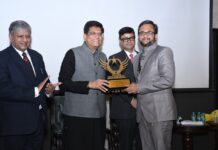New Delhi, November 08, 2023 : In this ever-changing, rapidly growing world full of technological advancements, an essential role is being played by agricultural technocrats to sustain the environment and human life. Traditional farming practices are a way to practice highly modernized industry driven by technology. Understanding agricultural technology is an asset to lead in this contemporary world. The transformation and intervention of agri technocrats possess a deep indispensable asset in this changing landscape of agriculture.
Agriculture is a highly evolved sector driven by technologies and innovations. It no longer relies on traditional methods of manpower. It is the unique blend of technology and agricultural knowledge to enhance productivity and efficiency. It is an innovative key to witnessing sustainable production. The agricultural technocrats are the architects of this profound transformation and shift towards biotechnology to data analytics and machinery agriculture.
The agri technocrats face various challenges in the technical agricultural industry. They work as a bridge to learn how to implement technology in agriculture in conventional farming practices. They practice cutting-edge technology to fill the gaps and adapt crop management, pest control, livestock management, and soil science at the same time.
The agri technocrats harness data to analyze, optimize crop yields, and reduce resource wastage. The primary role is to leverage technology to minimize the environmental impact on farming and improve sustainable agricultural practices with efficiency.
This is particularly crucial in this game-changing world where climate change and resource scarcity are growing concerns. Agri technocrats understand the adoption of precision agriculture and intricate the relationship between various factors like soil quality, crop varieties, and weather patterns to fine-tune the technology and have a win-win situation for both the environment and the farmers.
The agri technocrats use various approaches to champion precision agriculture and revolutionize farming. It includes tractors, drones, sensor-equipped machinery, and many more to tailor farming practices to the specific needs of this field. By this farmers can use fertilizers, pesticides, water, and fertilizers leading to higher yields of farmers to reduce the costs.
Biotechnology is a field where agricultural experts make important strides, particularly in the creation of genetically modified (GM) crops designed to withstand pests, diseases, and challenging environmental conditions. These GM crops not only boost agricultural productivity but also diminish the reliance on chemical pesticides, benefiting both farmers and the environment.
Furthermore, agricultural technocrats are actively involved in ensuring the safety of GM crops for human consumption and their ecological sustainability. They engage in partnerships with regulatory agencies to establish protocols for the research and deployment of GM crops, addressing issues regarding health, biodiversity, and the lasting impact on ecosystems.
Agricultural technocrats excel in the acquisition, scrutiny, and comprehension of extensive agricultural data. By employing advanced data analytics and machine learning techniques, they can make well-informed choices concerning crop supervision, resource distribution, and pest management. This data-centered strategy not only optimizes output but also aids in lessening risks, allowing farmers to more effectively adjust to shifting weather conditions and market requirements.
Agri technocrats, despite their notable contributions to agriculture, encounter various challenges. A key issue is ensuring that small-scale and traditional farmers can both access and make the most of the technologies and expertise they offer. Disparities in the adoption of technology can worsen inequalities within the agricultural industry.
Furthermore, the swift pace of technological advancement necessitates that agri-technocrats stay abreast of the most recent innovations. Ongoing learning and adaptability are crucial to guarantee that agricultural technology remains pertinent and efficient.
According to Dr.Parveen K. Jain, Dean of College of Agriculture Sciences, Teerthanker Mahaveer University
Agri technocrats are invaluable leaders in the modern agricultural landscape. They are the architects of agriculture’s evolution from a labor-intensive and resource-heavy sector into a sustainable, efficient, and technology-driven industry. Their profound understanding of agriculture and technical skills bridge the gap between tradition and innovation.
The future of agriculture relies on the contributions of these agri-technocrats. They will remain instrumental in addressing global food security challenges, promoting environmental sustainability, and enhancing productivity. By harnessing technology to optimize agriculture, they move us closer to a world where we can provide for a growing population while preserving our planet’s resources.
In a world where agriculture’s significance is greater than ever, agri-technocrats are the driving force behind advancements in this vital field. Their ongoing innovation and adaptability ensure that agriculture remains a cornerstone of sustainable development in the modern era.
Corporate Comm India (CCI Newswire)































